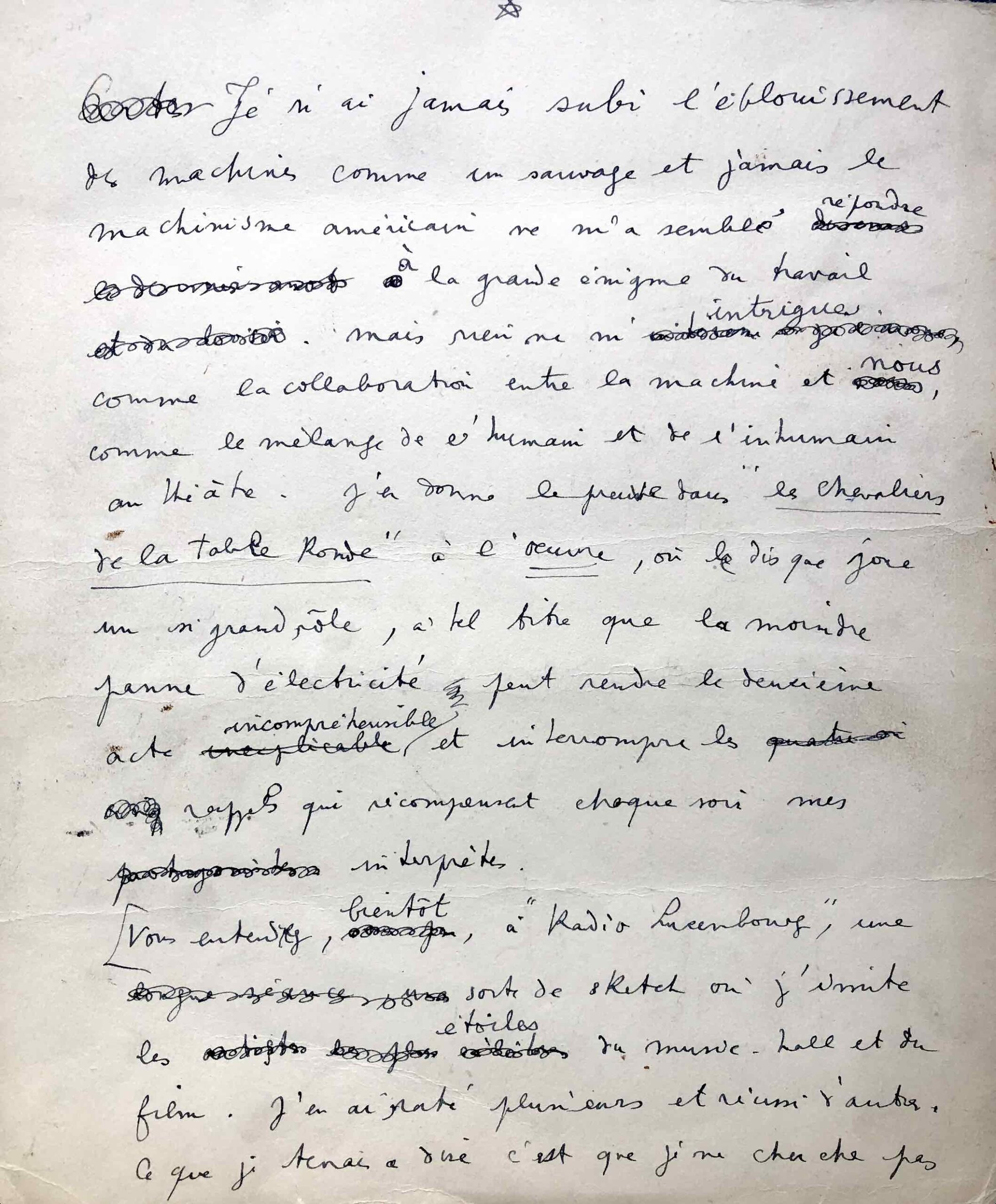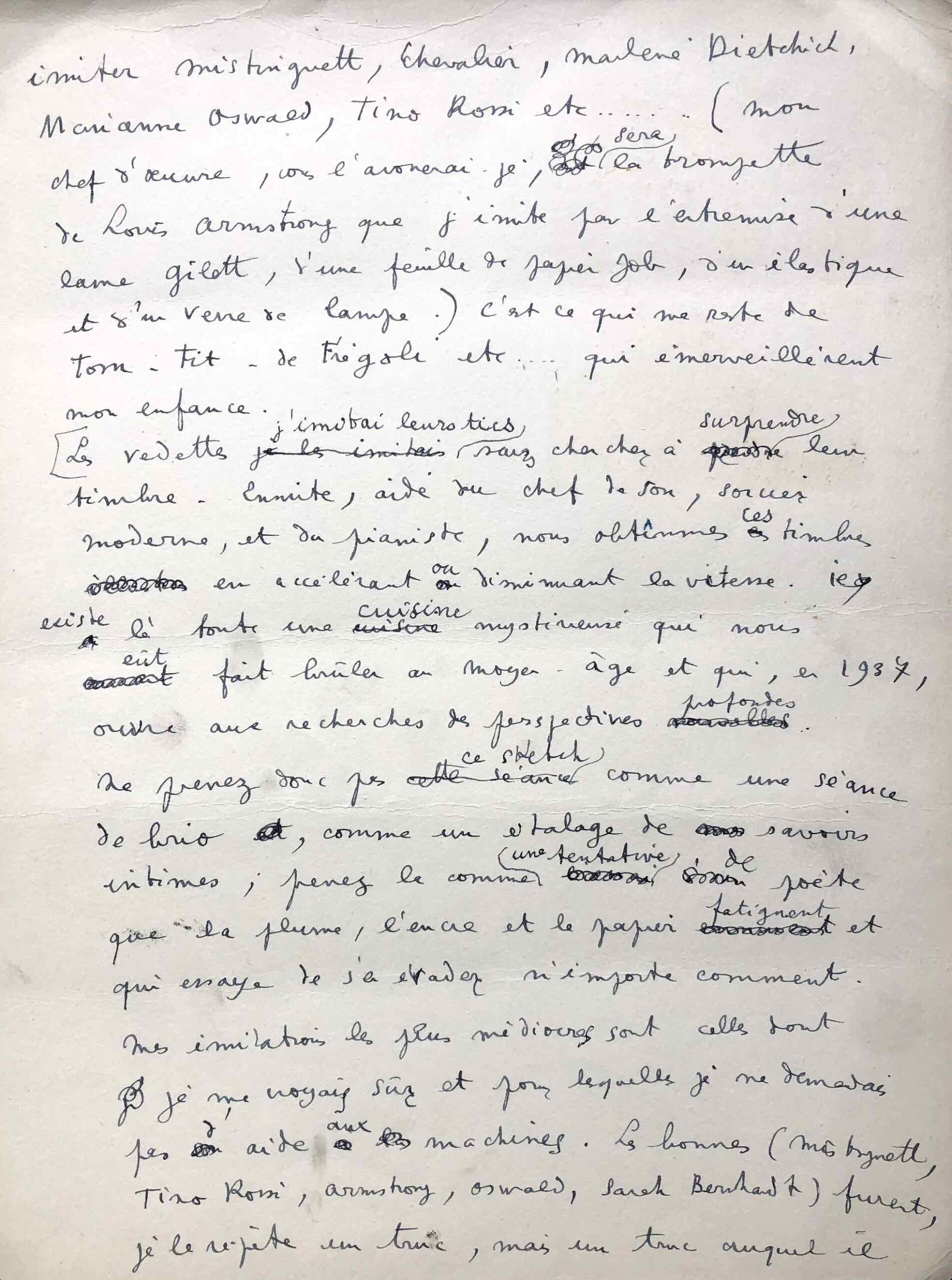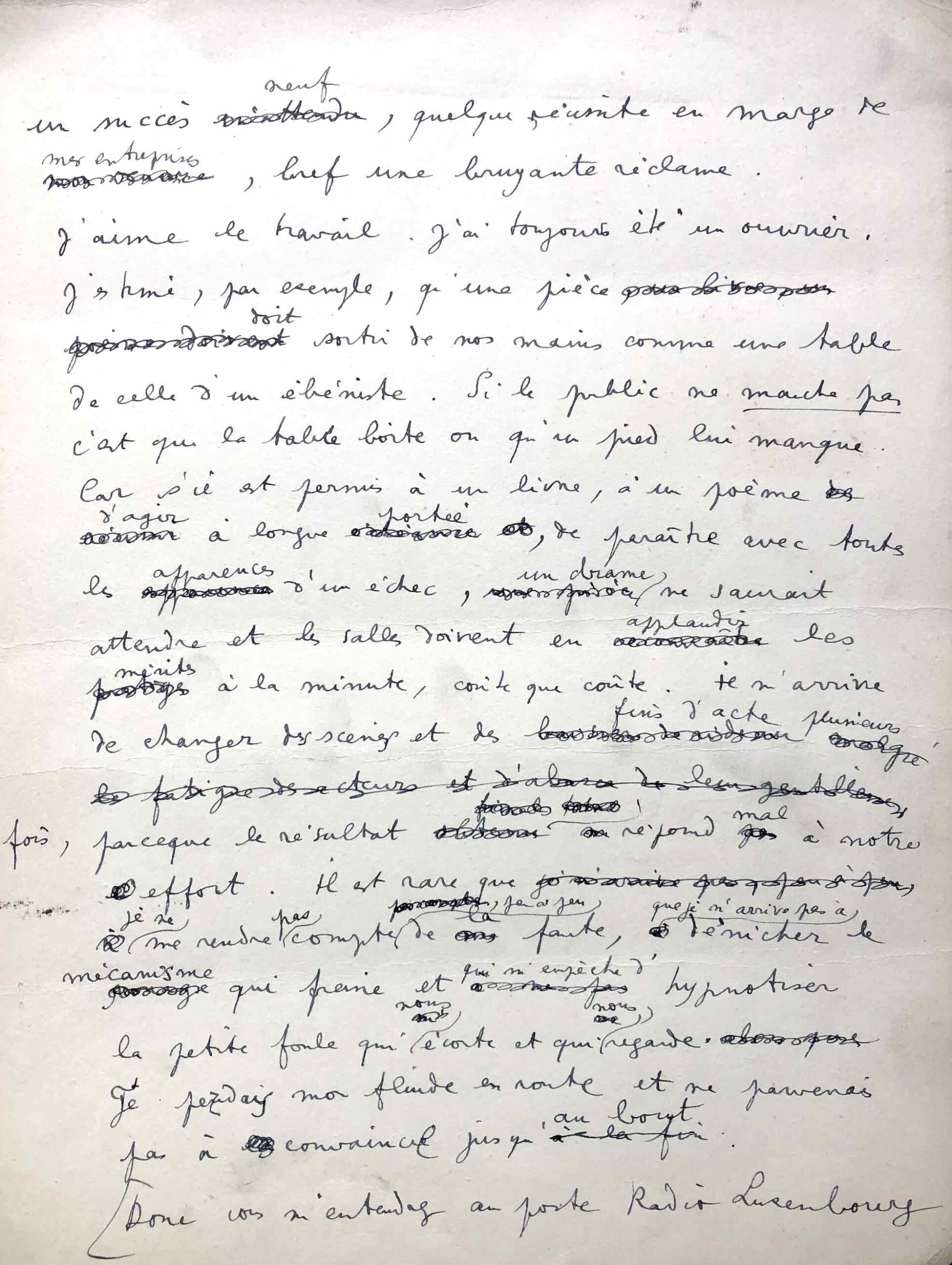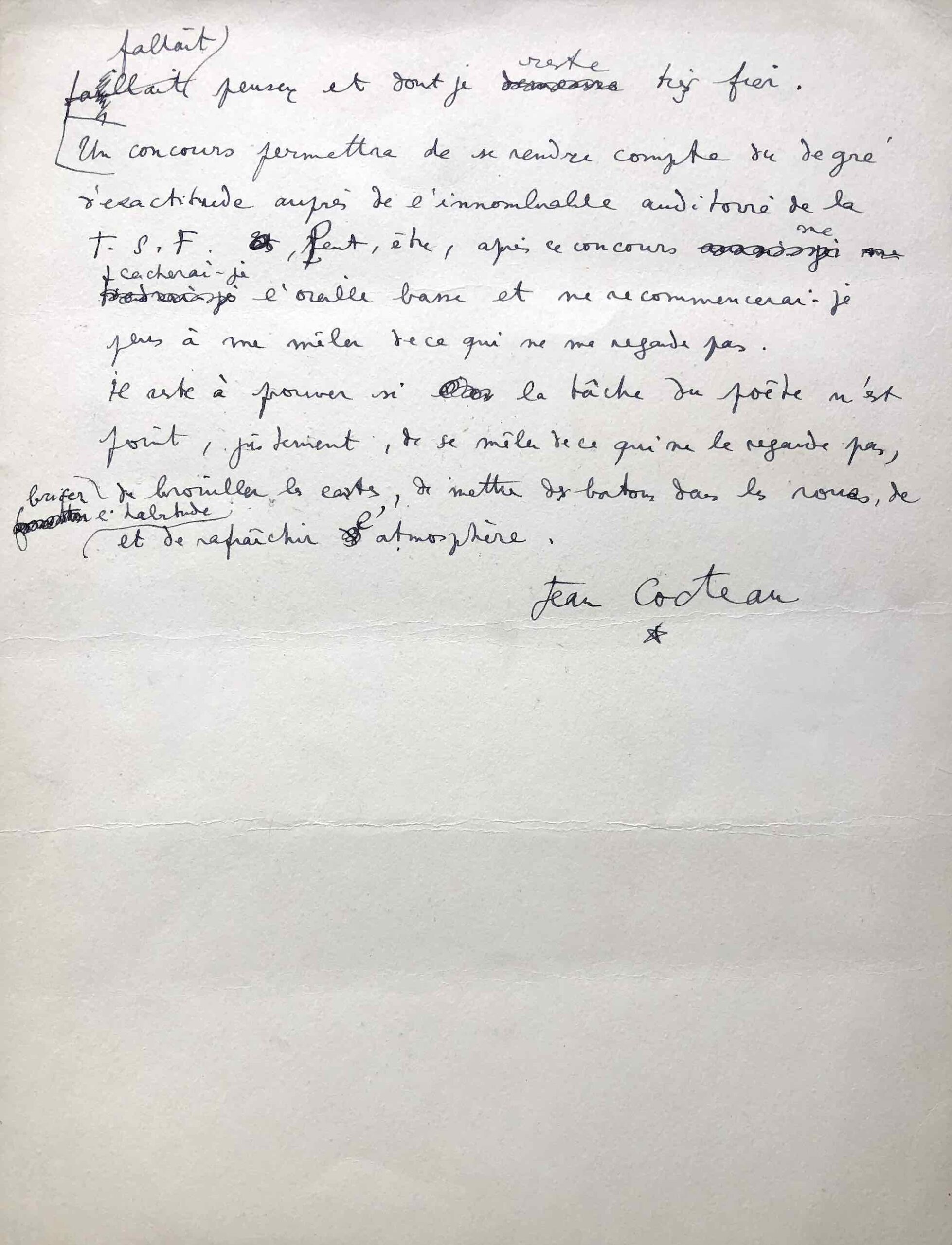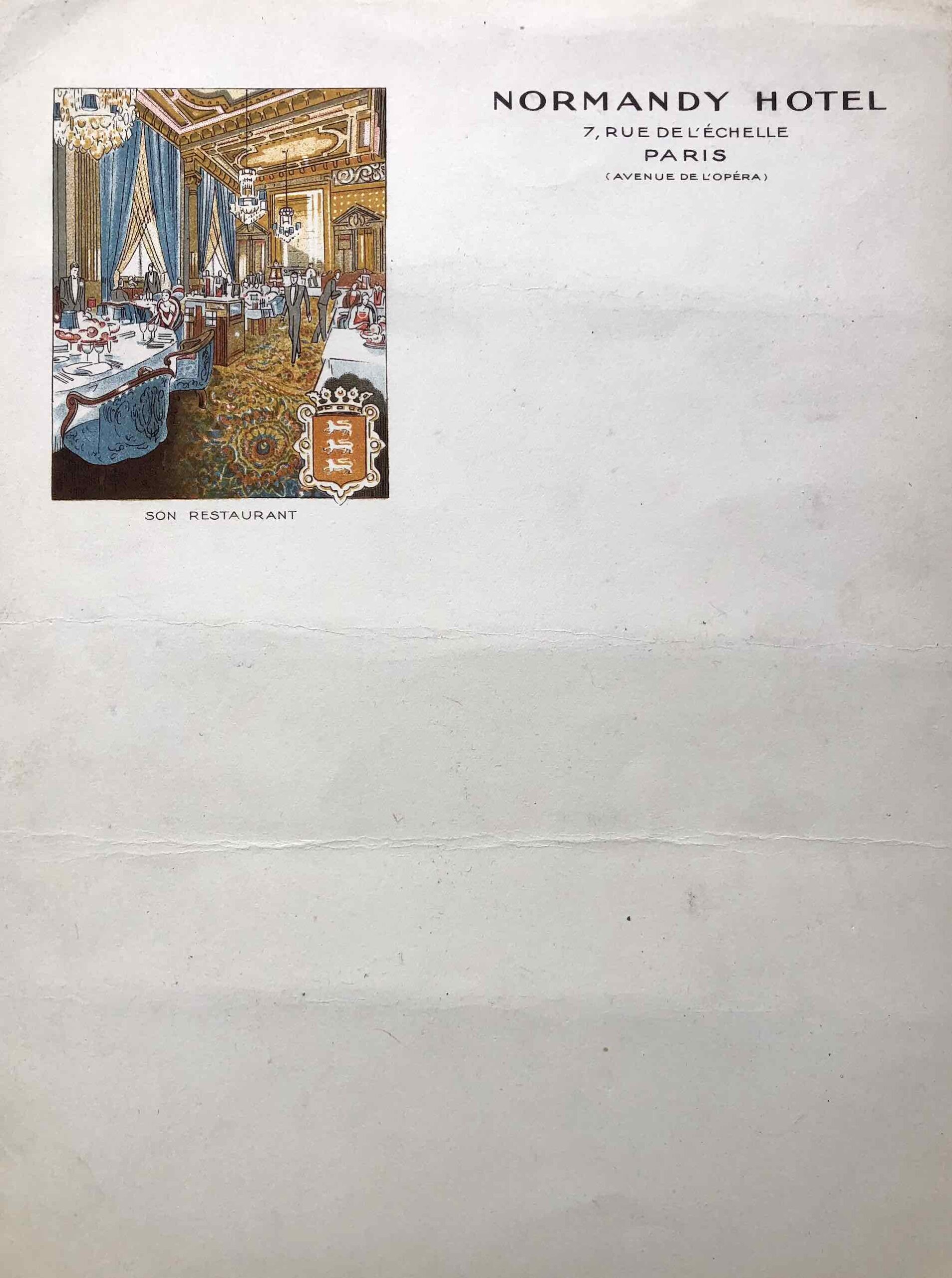Jean Cocteau (1889.1963)
Signed autograph manuscript – Dinner of heads.
Three ½ folio pages on the back of letterhead from the Normandy Hotel , Paris.
First page slightly cropped at the head, without affecting the text.
Without place or date [Paris, November 14-15, 1937].
Announcement of the Dinner of Heads broadcast by Radio Luxembourg, published in the daily Ce Soir under the title: Machines infernales.
« My masterpiece, I will admit, will be Louis Armstrong's trumpet which I imitate using a Gilett blade, a sheet of Job paper, an elastic band and a lamp glass »
Announcement of Dîner de têtes, the radio broadcast of imitations by Jean Cocteau of music-hall and cinema personalities, broadcast in November 1937 on Radio Luxembourg: first draft autograph manuscript, with numerous corrections.
___________________________________
« I have never suffered the dazzle of machines like a savage and American machinery has never seemed to me to respond to the great enigma of work. But nothing intrigues me like the collaboration between the machine and us, like the mixture of the human and the inhuman in the theater. I provide proof of this in “The Knights of the Round Table” at Work, where the disc plays such a big role, such that the slightest power outage can make the second act incomprehensible and interrupt the encores which reward my performers every evening.
You will soon hear on “Radio Luxembourg” a sort of sketch where I imitate the stars of music hall and film. I failed several and passed others. What I wanted to say is that I am not looking for a new success, some success on the sidelines of my companies, in short a noisy advertisement.
I like the work. I have always been a worker. I believe, for example, that a piece should come out of our hands like a table from that of a cabinetmaker. If the audience does n't walk, it's because the table is limping or a leg is missing. Because if it is allowed for a book, for a poem to act on a long-term scale, to appear with all the appearances of failure, a drama cannot wait and the theaters must applaud its merits at the minute, no matter what. cost. I sometimes change scenes and endings of acts several times, because the result does not respond well to our effort. It is rare that I do not realize, little by little, the fault, that I cannot find the mechanism which slows me down and which prevents me from hypnotizing the small crowd who listen to us and who watch us. I lost my fluid on the way and couldn't convince until the end.
So you will hear me on Radio Luxembourg imitating Mistinguett, Chevalier, Marlène Dietrich, Marianne Oswald, Tino Rossi, etc…… (My masterpiece, I will admit, will be Louis Armstrong's trumpet which I imitated using a Gilett blade, a sheet of Job paper, an elastic band and a lamp glass.) This is what remains of Tom-Tit, Fregoli etc… who amazed me my childhood.
I imitated the stars' mannerisms without trying to surprise their tone. Then, with the help of the sound director, a modern wizard, and the pianist, we obtained these timbres by accelerating or decreasing the speed. There is a whole mysterious cuisine there which would have set us on fire in the Middle Ages and which, in 1937, opened up profound perspectives for research.
So don't take this sketch as a show of brilliance, as a display of intimate knowledge; take it as an attempt by a poet who is tired of pen, ink and paper and who tries to escape any way he can. My poorest imitations are the ones I thought I was sure of and for which I didn't ask the machines for help. The good ones (Mistinguett, Tino Rossi, Armstrong, Oswald, Sarah Bernhardt) were, I repeat, something, but something to think about and of which I remain very proud.
A competition will make it possible to assess the degree of accuracy among the innumerable TSF audience. Perhaps, after this competition, I will keep my ears down and I will no longer start getting involved in things that do not interest me. Do not look. It remains to be proven whether the task of the poet is not, precisely, to meddle in what does not concern him, to muddy the waters, to put obstacles in the way, to break the habit and to refresh the atmosphere. Jean Cocteau . »
___________________________________
A genius jack of all trades, Cocteau was interested in radio for which he designed several broadcasts; the best known was the Dinner of Heads, a sketch of imitations of ten famous voices: Mistinguett, Maurice Chevalier, Marlène Dietrich, Marianne Oswald, Tino Rossi, Sarah Bernhardt and Louis Armstrong, as he announces here, but also Max Jacob , Greta Garbo and Marcel Proust. The sketch was broadcast on Radio Luxembourg on November 29, 1937 from 9:30 p.m. to 10:05 p.m.
The imitation of which the writer admits to being most proud is that of Louis Armstrong's trumpet, " using a Gilette blade, a sheet of Job paper, an elastic band and a glass lamp ”: it recalls the role played by Cocteau in the introduction of jazz to France. (Cf. Jacques T. Quentin, Jazz and artistic modernities through the prism of the work of Jean Cocteau in “Jazz & Lettres”, Geneva, Bibliothèque Bodmer, 2017, pp. 77-88.)
Jean Masson, editor-in-chief of Radio Luxembourg at the time, remembered that one of the “tricks” mentioned by Cocteau consisted of mixing real voices into the imitation recordings – notably for Sarah Bernhardt.
The announcement of the upcoming broadcast of his program and of a competition was intended for the communist newspaper Ce Soir , to which Jean Cocteau collaborated for several years: it appeared under the title “Machines infernales” on page 2 of the daily, on November 16, 1937.
The manuscript contains numerous deletions and corrections which we have not reproduced here in order to facilitate reading.

